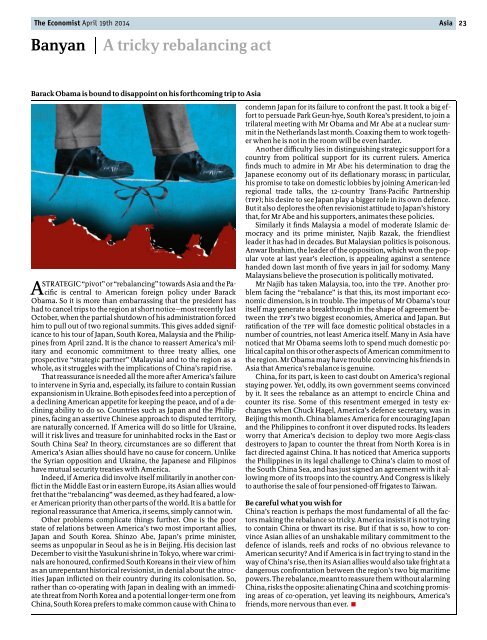The Economist - 19_25 April 2014
The Economist - 19_25 April 2014
The Economist - 19_25 April 2014
- No tags were found...
Create successful ePaper yourself
Turn your PDF publications into a flip-book with our unique Google optimized e-Paper software.
<strong>The</strong> <strong>Economist</strong> <strong>April</strong> <strong>19</strong>th <strong>2014</strong> Asia 23BanyanA tricky rebalancing actBarackObama is bound to disappoint on his forthcoming trip to AsiaASTRATEGIC“pivot” or“rebalancing” towards Asia and the Pacificis central to American foreign policy under BarackObama. So it is more than embarrassing that the president hashad to cancel trips to the region at short notice—most recently lastOctober, when the partial shutdown ofhis administration forcedhim to pull out of two regional summits. This gives added significanceto his tour of Japan, South Korea, Malaysia and the Philippinesfrom <strong>April</strong> 22nd. It is the chance to reassert America’s militaryand economic commitment to three treaty allies, oneprospective “strategic partner” (Malaysia) and to the region as awhole, as it struggles with the implications ofChina’s rapid rise.That reassurance is needed all the more afterAmerica’s failureto intervene in Syria and, especially, its failure to contain Russianexpansionism in Ukraine. Both episodesfeed into a perception ofa declining American appetite for keeping the peace, and of a decliningability to do so. Countries such as Japan and the Philippines,facing an assertive Chinese approach to disputed territory,are naturally concerned. If America will do so little for Ukraine,will it risk lives and treasure for uninhabited rocks in the East orSouth China Sea? In theory, circumstances are so different thatAmerica’s Asian allies should have no cause for concern. Unlikethe Syrian opposition and Ukraine, the Japanese and Filipinoshave mutual security treaties with America.Indeed, if America did involve itself militarily in another conflictin the Middle East or in eastern Europe, its Asian allies wouldfret that the “rebalancing” was deemed, as they had feared, a lowerAmericanpriority than otherparts ofthe world. It is a battle forregional reassurance that America, it seems, simply cannot win.Other problems complicate things further. One is the poorstate of relations between America’s two most important allies,Japan and South Korea. Shinzo Abe, Japan’s prime minister,seems as unpopular in Seoul as he is in Beijing. His decision lastDecemberto visit the Yasukuni shrine in Tokyo, where war criminalsare honoured, confirmed South Koreans in their view ofhimas an unrepentant historical revisionist, in denial about the atrocitiesJapan inflicted on their country during its colonisation. So,rather than co-operating with Japan in dealing with an immediatethreat from North Korea and a potential longer-term one fromChina, South Korea prefers to make common cause with China tocondemn Japan for its failure to confront the past. It took a big effortto persuade Park Geun-hye, South Korea’s president, to join atrilateral meeting with Mr Obama and Mr Abe at a nuclear summitin the Netherlands last month. Coaxing them to work togetherwhen he is not in the room will be even harder.Another difficulty lies in distinguishing strategic support for acountry from political support for its current rulers. Americafinds much to admire in Mr Abe: his determination to drag theJapanese economy out of its deflationary morass; in particular,his promise to take on domestic lobbies by joining American-ledregional trade talks, the 12-country Trans-Pacific Partnership(TPP); his desire to see Japan play a bigger role in its own defence.Butitalso deploresthe often revisionistattitude to Japan’shistorythat, for Mr Abe and his supporters, animates these policies.Similarly it finds Malaysia a model of moderate Islamic democracyand its prime minister, Najib Razak, the friendliestleader it has had in decades. But Malaysian politics is poisonous.AnwarIbrahim, the leaderofthe opposition, which won the popularvote at last year’s election, is appealing against a sentencehanded down last month of five years in jail for sodomy. ManyMalaysians believe the prosecution is politically motivated.Mr Najib has taken Malaysia, too, into the TPP. Another problemfacing the “rebalance” is that this, its most important economicdimension, is in trouble. <strong>The</strong> impetus of Mr Obama’s touritselfmay generate a breakthrough in the shape ofagreement betweenthe TPP’s two biggest economies, America and Japan. Butratification of the TPP will face domestic political obstacles in anumber of countries, not least America itself. Many in Asia havenoticed that Mr Obama seems loth to spend much domestic politicalcapital on this orotheraspects ofAmerican commitment tothe region. MrObama may have trouble convincinghis friends inAsia that America’s rebalance is genuine.China, for its part, is keen to cast doubt on America’s regionalstaying power. Yet, oddly, its own government seems convincedby it. It sees the rebalance as an attempt to encircle China andcounter its rise. Some of this resentment emerged in testy exchangeswhen Chuck Hagel, America’s defence secretary, was inBeijing this month. China blames America for encouraging Japanand the Philippines to confront it over disputed rocks. Its leadersworry that America’s decision to deploy two more Aegis-classdestroyers to Japan to counter the threat from North Korea is infact directed against China. It has noticed that America supportsthe Philippines in its legal challenge to China’s claim to most ofthe South China Sea, and has just signed an agreement with it allowingmore of its troops into the country. And Congress is likelyto authorise the sale offour pensioned-offfrigates to Taiwan.Be careful what you wish forChina’s reaction is perhaps the most fundamental of all the factorsmaking the rebalance so tricky. America insists it is not tryingto contain China or thwart its rise. But if that is so, how to convinceAsian allies of an unshakable military commitment to thedefence of islands, reefs and rocks of no obvious relevance toAmerican security? And ifAmerica is in fact trying to stand in theway ofChina’s rise, then its Asian allies would also take fright at adangerous confrontation between the region’s two big maritimepowers. <strong>The</strong> rebalance, meant to reassure them withoutalarmingChina, risks the opposite: alienating China and scotching promisingareas of co-operation, yet leaving its neighbours, America’sfriends, more nervous than ever. 7


